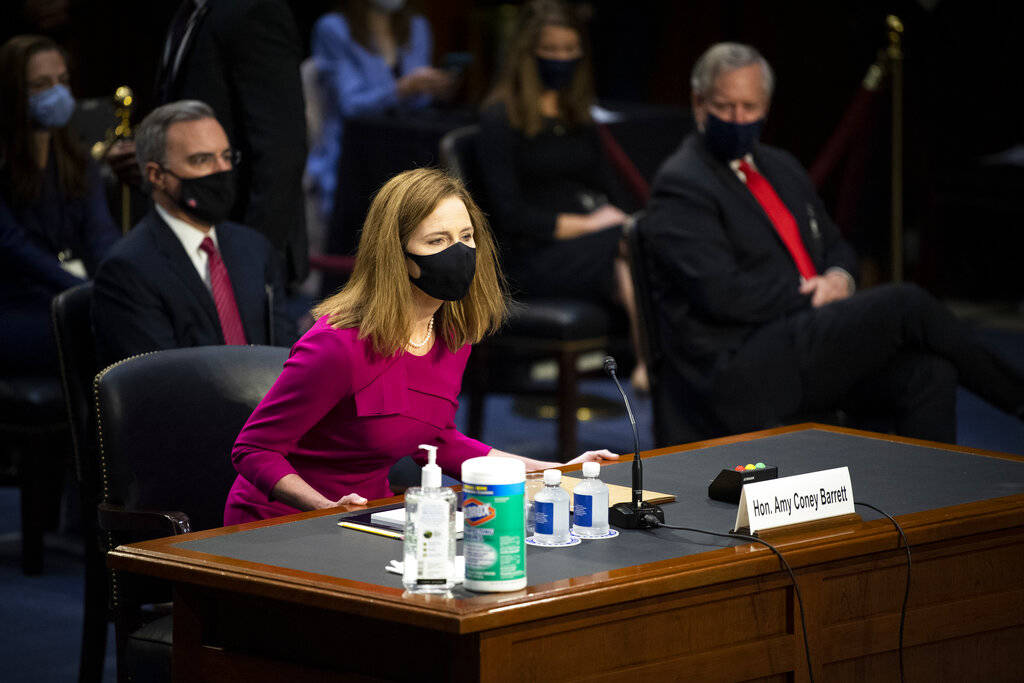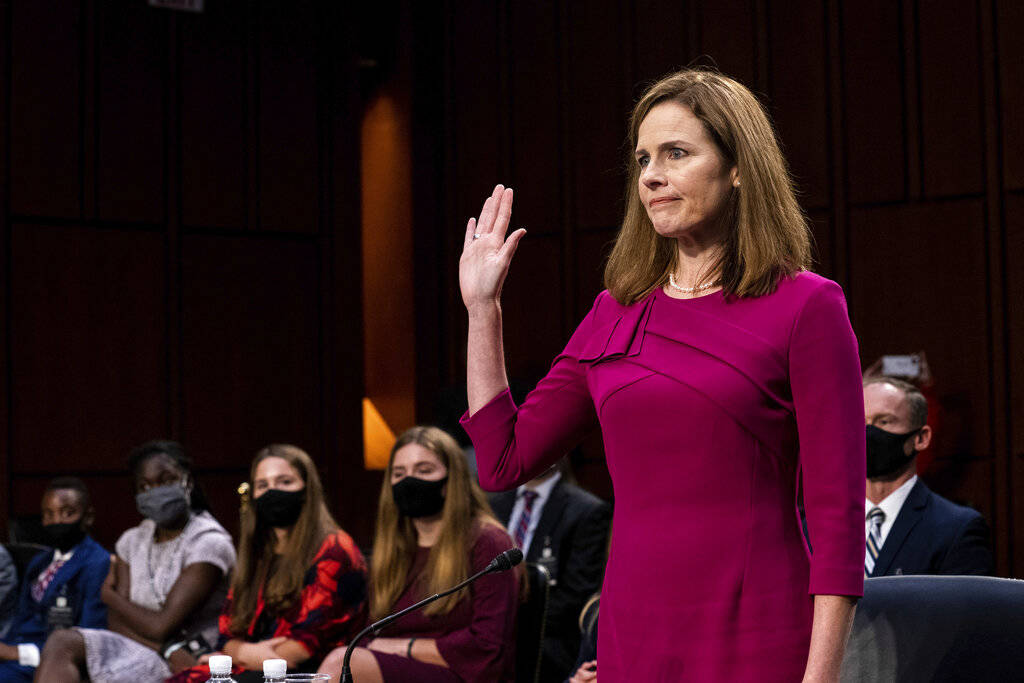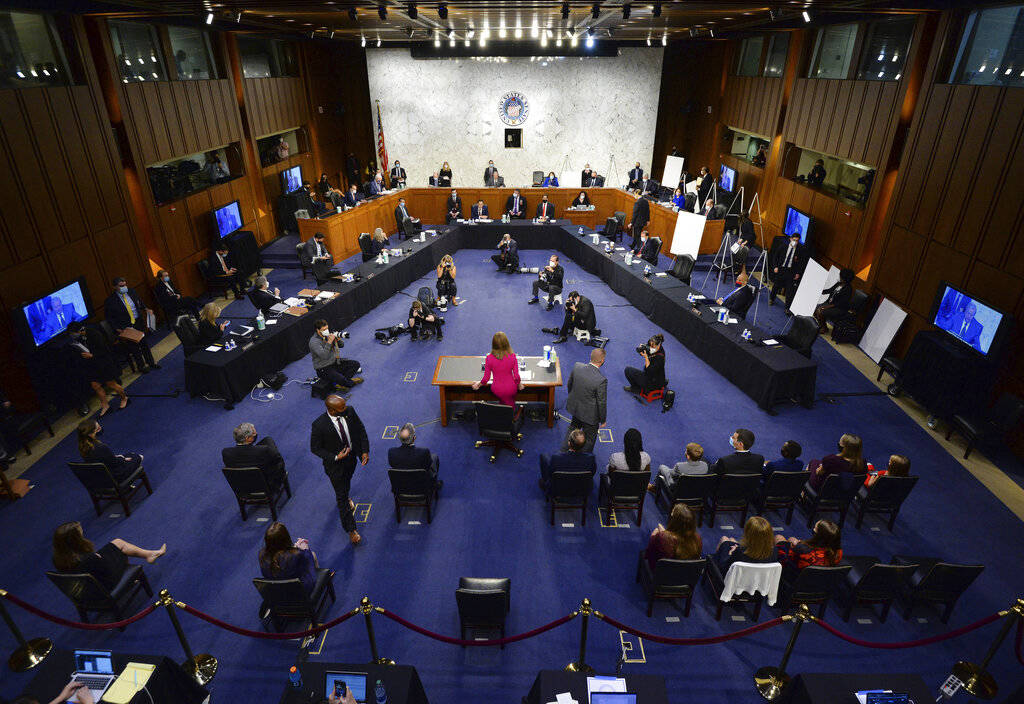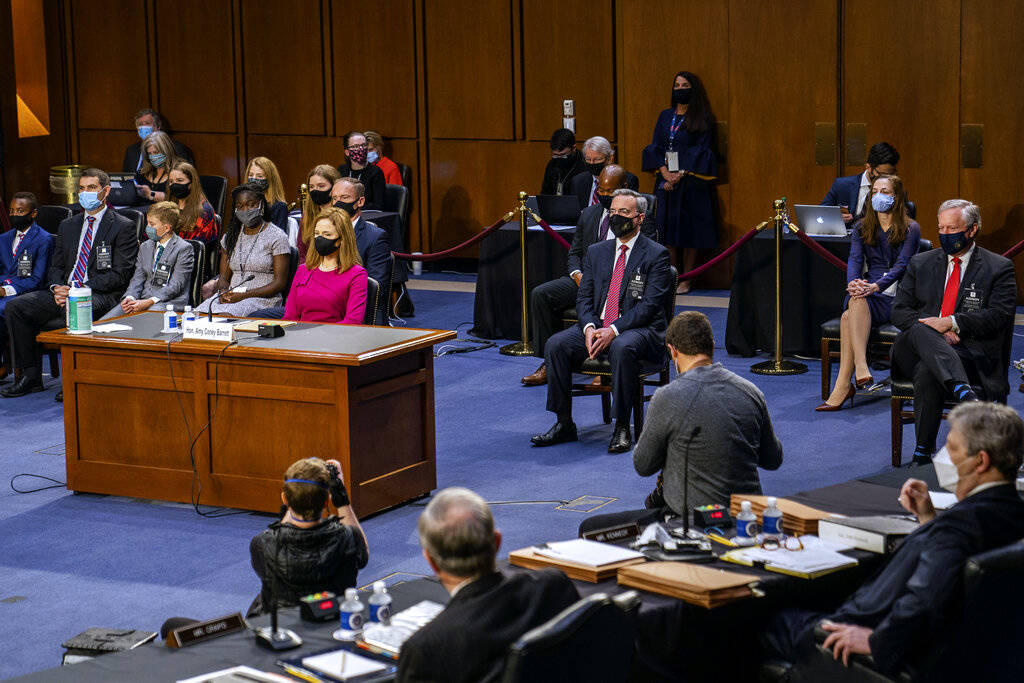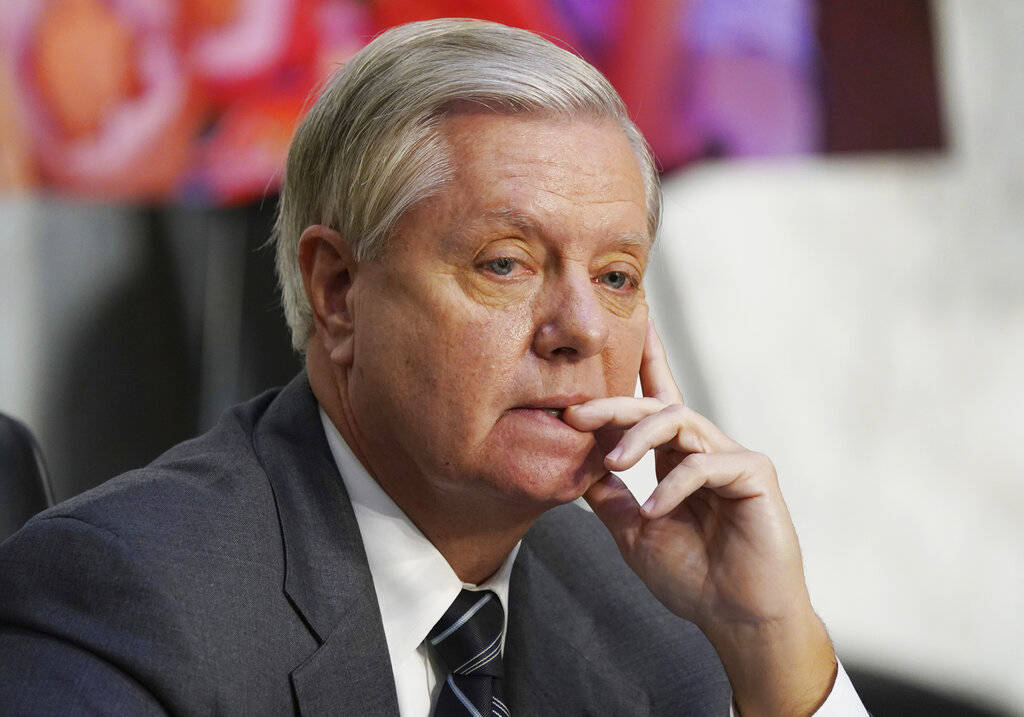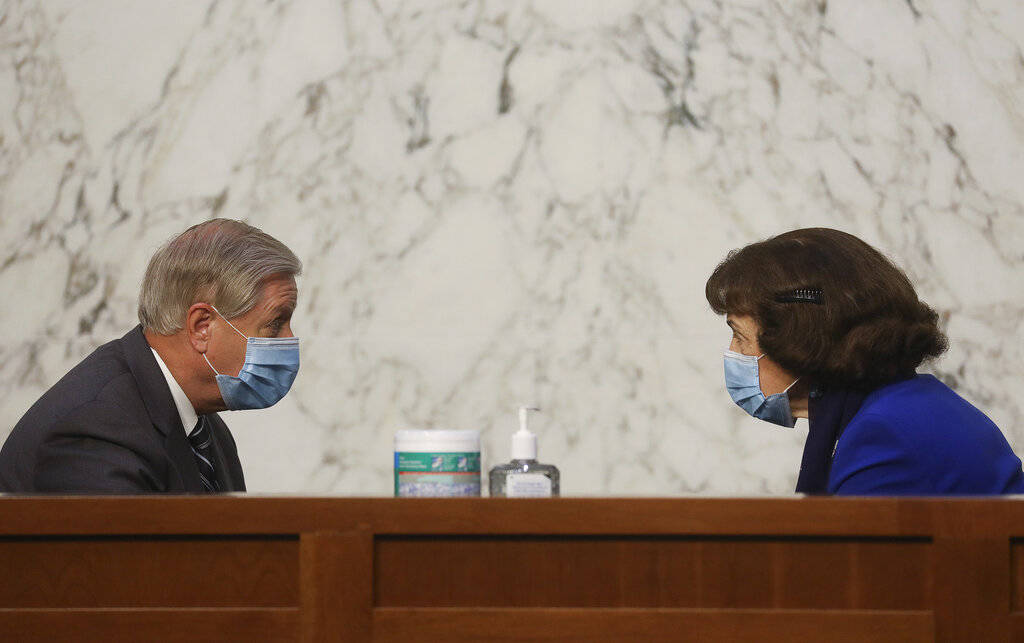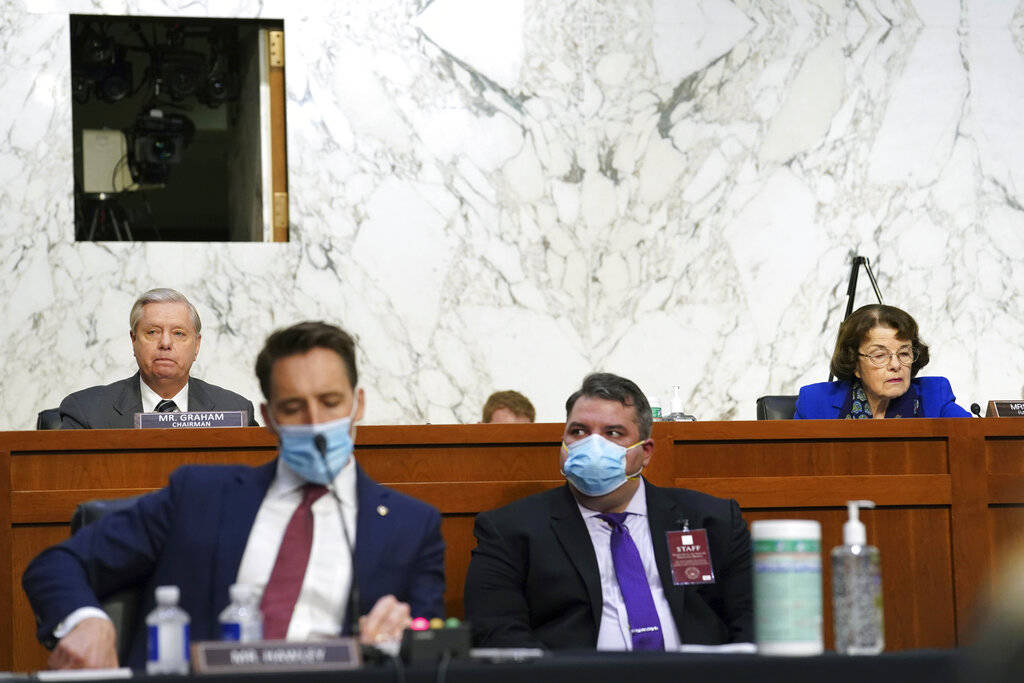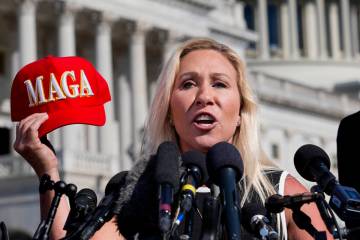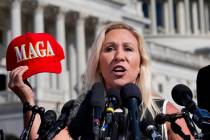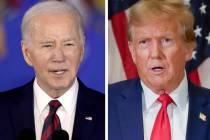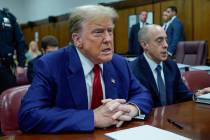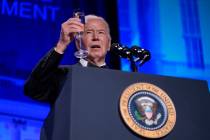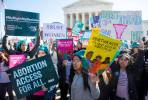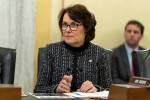Barrett confirmation hearings begin with partisan elbowing
WASHINGTON — Judge Amy Coney Barrett told a Senate panel Monday that if confirmed to serve on the U.S. Supreme Court she would adhere to the Constitution as did her conservative mentor, the late Justice Antonin Scalia.
On the first day of Barrett’s confirmation hearings, Republican and Democratic senators elbowed to shape the debate with an eye on the upcoming election, now just three weeks away.
Majority Republicans praised Barrett’s qualifications and originalist credentials, while minority Democrats focused on an upcoming constitutional challenge to Obamacare during individual speeches by lawmakers. The day ended with Barrett giving an opening statement.
Things are expected to get testy Tuesday when the Senate Judiciary Committee begins questioning Barrett.
“This is going to be a long, contentious week,” said Sen. Lindsey Graham, R-S.C., the chairman of the committee who wants the panel to vote to move the nomination to the full Senate next week.
White House chief of staff Mark Meadows told reporters he hoped the hearing would remain civil, without too much drama, a reference to the partisan brawl that erupted during the 2018 confirmation hearings for Justice Brett Kavanaugh.
Coronavirus precautions
Graham gaveled the hearing to order in a cavernous Senate room that was packed for the confirmation hearings for Kavanaugh and Justice Neil Gorsuch, but was reconfigured by the Capitol architect and health care professionals to adhere to coronavirus guidelines set by the Centers of Disease Control and Prevention.
With lawmakers, the Barrett family and media spaced, and masks required, Barrett ended her day pledging to uphold the rule of law without legislating from the bench.
“A judge must apply the law as it is written, not as the judge wishes it were,” said Barrett, a 7th U.S. Circuit Court of Appeals judge who decades ago clerked for Scalia when he served on the high court. Scalia died in 2016 and was succeeded by Gorsuch, President Donald Trump’s first nominee to the Supreme Court.
Barrett’s judicial philosophy, temperament, legal decisions and writings as a law professor will be the focus of questioning this week. Trump nominated Barrett, 48, to fill the vacancy created by the death of Justice Ruth Bader Ginsburg, a liberal icon for her advocacy for women and civil rights.
Barrett acknowledged Ginsburg’s trailblazing in her statement to the committee.
“I have been nominated to fill Justice Ginsburg’s seat, but no one will ever take her place,” Barrett told the committee. “I will be forever grateful for the path she marked and the life she led.”
Republicans are rushing to fill the seat before the Nov. 3 presidential election and consolidate a solid five-member conservative majority on the Supreme Court, with Chief Justice John Roberts — nominated by Republican President George W. Bush — a swing vote on some issues.
The GOP holds a 53-47 majority in the Senate. But polls of likely voters nationally and in key swing states show possible Democratic gains in the Senate. Democrats lack the votes to block confirmation until then and have
cited Barrett’s decisions and writings to paint her as a jurist outside the mainstream and a threat to health care and abortion rights.
Republicans confident
Barrett faced contentious hearings three years ago when she was confirmed to the appeals court seat. Legal scholars expect her to be prepared for the line of questions Democrats are likely to hurl at the nominee.
Republicans are confident. One by one, GOP lawmakers cited her qualifications to serve on the high court.
“I’m confident that at the end of this process, you will be confirmed to the United States Supreme Court,” said Sen. John Cornyn, R-Texas.
Graham also noted a majority of the American Bar Association panel who reviewed Barrett’s nomination rated her as “well qualified.”
Senate Majority Leader Mitch McConnell, R-Ky., said he would schedule a vote on confirmation for the end of the month.
Sen. Dianne Feinstein, D-Calif., the ranking Democrat on the committee, said the Senate should wait until after the election to allow the next president to select the nominee to fill the Supreme Court vacancy. She noted early voting is underway in 40 states.
Feinstein also pointed out Barrett’s criticism of Roberts’ opinion upholding the Affordable Care Act in 2012, and the fact that the the ACA will face another constitutional challenge before the high court next month.
“Health coverage for millions of Americans is at stake with this nomination,” Feinstein said.
Nevadans divided
Nevada Democratic Sens. Catherine Cortez Masto and Jacky Rosen have said they oppose the Barrett nomination, citing concerns that the end of protections provided by the ACA would have a devastating impact on the state’s residents.
The Nevada senators are not on the Judiciary Committee, but will vote on confirmation.
House lawmakers have no role in the confirmation process, but Rep. Mark Amodei, R-Nev., said that Barrett was confirmed in 2017 to serve as an federal appellate court, thus underscoring her qualifications.
Amodei said every president’s job is to nominate someone when there is a vacancy. “That’s always been done. This administration has been nothing if not transparent.”
Hybrid hearings
Senators on the Judiciary Committee participated in the hearing Monday both in person and virtually.
Two Republican senators who attended a Rose Garden ceremony where Trump announced his nomination of Barrett to fill the Supreme Court vacancy, Mike Lee of Utah and Thom Tillis of North Carolina, later tested positive for COVID-19. Lee participated in the hearing in person, saying he felt great.
Tillis gave his statement via video hookup. He said Barrett was “highly qualified to do this job.”
Democratic vice presidential candidate Kamala Harris, D-Calif., who also sits on the panel, gave a virtual statement that criticized Republicans for holding a hearing in a closed room during a pandemic that is spread by airborne particles.
“This hearing should have been postponed,” Harris said.
Harris also criticized GOP colleagues for failing to vote on a coronavirus relief bill that was passed by the House 150 days ago, while taking just 16 days to nominate and hold confirmation hearings on a Supreme Court nominee.
Republican senators noted, however, that Democrats filibustered a Republican version of a coronavirus relief bill that was smaller than the Democratic version.
And Graham rebutted Harris’ criticism, noting the extra lengths taken to provide safety to those at the hearing.
Different kind of hearing
Republicans have seized on the Supreme Court confirmation hearings to rally conservative voters and shift the election debate away from the Democrats and their focus on health care, the Trump administration’s handling of the coronavirus outbreak and the rising death toll.
But the ramifications of the pandemic were clearly on display at the hearing, where no spectators were present and everyone wore masks when not speaking.
Public demonstrations, both for and against the nomination, took place outside Senate office buildings.
Chants of “Let the people decide” were shouted by those opposed to the Republican move to seat Barrett before the election. On the same sidewalk, supporters of Trump’s pick chanted, “Fill that seat.”
Barrett was introduced by both Indiana senators, Republicans Todd Young and Mike Braun, and Patricia O’Hara, a professor and former dean of Notre Dame Law School. O’Hara spoke after Barrett because of a technical glitch.
Feinstein, in 2017, queried Barrett about how her religious views would impact her judicial decisions, a line of questioning that drew a rebuke from Republicans then and now, as well as public criticism.
Although Democrats avoided that line of criticism on Monday, Republicans repeatedly brought up her faith in their defense of Barrett and accused Democrats of religious bigotry.
“It’s wrong,” said Sen. Joni Ernst, R-Iowa.
Contact Gary Martin at gmartin@reviewjournal.com or 202-662-7390. Follow @garymartindc on Twitter.



